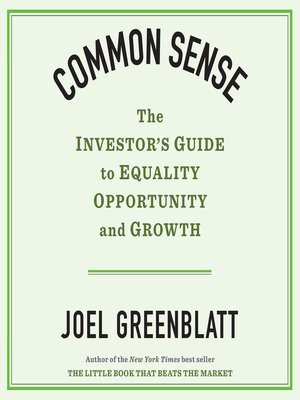Common Sense
audiobook (Unabridged) ∣ The Investor's Guide to Equality, Opportunity, and Growth
By Joel Greenblatt

Sign up to save your library
With an OverDrive account, you can save your favorite libraries for at-a-glance information about availability. Find out more about OverDrive accounts.
Find this title in Libby, the library reading app by OverDrive.



Search for a digital library with this title
Title found at these libraries:
| Library Name | Distance |
|---|---|
| Loading... |
The United States is supposed to offer economic opportunity to everyone. So why are so many people left out in the cold? Globalization and technological change have ravaged the workforce. Hostile immigration policies actually keep Americans from getting jobs. Our education system is deeply unequal, denying opportunity to millions right from the start. Still, we can't seem to break from the status quo.
In Common Sense, Joel Greenblatt offers an investor's perspective on building an economy that truly works for everyone. With dry and self-deprecating wit, he makes a lively and provocative case for disruptive new approaches—some drawn from personal experience, some from the outside looking in. How do we ensure that all children have an opportunity for a good education? Does getting a college degree have to be a requirement for getting a good job? If we subsidize banks, how do we ensure that the risks and rewards are distributed fairly? Greenblatt shows why expanding an already existing program might help more people than raising the minimum wage, how dramatically increasing immigration would be like giving every American a bonus, and the reason Australia might be the best place to learn about saving for retirement. Not everyone will agree with what Greenblatt has to say—but all of us can benefit from the conversations he aims to start.
In Common Sense, Joel Greenblatt offers an investor's perspective on building an economy that truly works for everyone. With dry and self-deprecating wit, he makes a lively and provocative case for disruptive new approaches—some drawn from personal experience, some from the outside looking in. How do we ensure that all children have an opportunity for a good education? Does getting a college degree have to be a requirement for getting a good job? If we subsidize banks, how do we ensure that the risks and rewards are distributed fairly? Greenblatt shows why expanding an already existing program might help more people than raising the minimum wage, how dramatically increasing immigration would be like giving every American a bonus, and the reason Australia might be the best place to learn about saving for retirement. Not everyone will agree with what Greenblatt has to say—but all of us can benefit from the conversations he aims to start.







